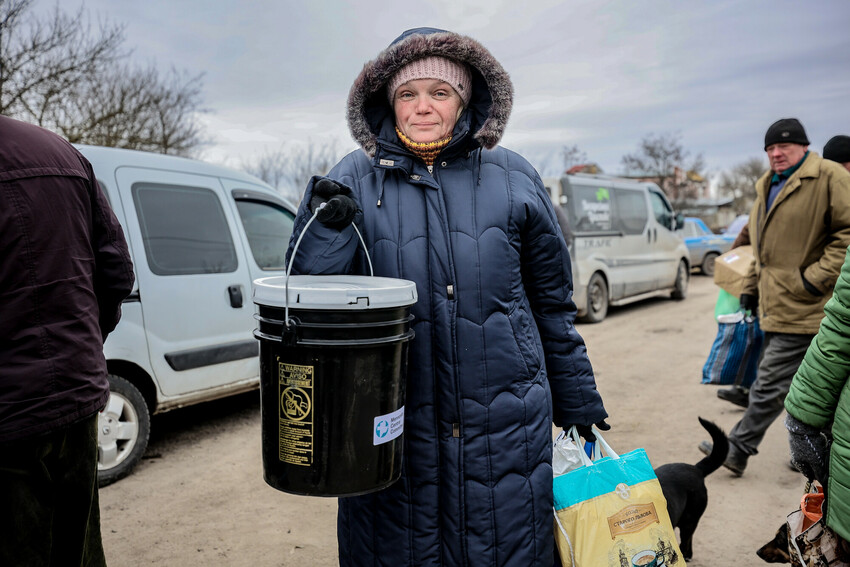Special Issue: Russian military invasion of Ukraine

Ukraine and nonviolence
Six points of view. First, MCC Canada Executive Director Rick Cober Bauman responds to a question many have asked him: Does MCC’s voice of non-violent, non-military responses to violence have credibility in the face of Russian military aggression? Second, Anabaptist World editor Paul Schrag writes that Mennonite Brethren pastor Maxym Oliferovski wouldn’t condemn fellow Ukrainians who take up arms in the fight. “For his people,” writes Schrag, “the hard questions about pacifism — ‘what would you do if . . .?’ — are not hypothetical now.” Shrag notes that in the civil war that followed the Bolshevik Revolution, Mennonite men organized armed selbstschutz (self-defense) units to defend their villages. Third, in an open letter to Russian Orthodox Patriarch Kirill, the president of the Mennonite World Conference wrote that “When Peter pulled out a sword, Jesus told him to put it away.” Fourth, Marie Dennis of Pax Christi International and the Catholic Nonviolence Initiative argues that Ukraine shows we must reject the possibility that any war can be just. Fifth, in Parsing Pacifism: Ukraine’s Mennonite Heritage Shapes Evangelical Responses to Russia, Christianity Today magazine reports on Anabaptists wrestling with the challenge of trauma and forgiveness, and differing views on nonviolence between older and younger generations. “Most people in our churches will not pick up a gun, but we will not condemn a soldier,” says one pastor from the Association of Mennonite Brethren Churches of Ukraine. Finally, justice and peace scholar Eli McCarthy at Georgetown University offers five ways to support non-violent resistance in Ukraine, including not dehumanizing adversaries even when they commit great wrongs.
Ukraine and the shadow of Syria
Casting a grim shadow over Ukraine is a playbook used by Vladimir Putin in Syria: targeted killing of civilians, mass destruction of cities, igniting a refugee crisis, appearing at the peace table as a stalling tactic. Unlike Ukraine, the world’s voice was largely silent in responding to Syria’s devastation, where half the population of 25 million has been displaced, Russia allegedly supported chemical weapon attacks and the war is in its twelfth year. “The Russians are willing to devour the green and the dry,” a Syrian activist told the New York Times, using an Arabic idiom meaning to destroy everything. “They don’t care about the international community or anything else. We saw that in Syria. Burning schools is not new to us. It’s land they want to take, and they will take it.”
Sanctions: Non-violent tool or lethal weapon?
Unprecedented sanctions have been taken against Russia — what stance should the church take? Can sanctions be non-violent? Three pioneers of nonviolence used boycotts and sanctions as critical tactics of resistance. Mahatma Gandhi organized mass boycotts of British goods and institutions in seeking independence for India. Archbishop Desmond Tutu supported harsh sanctions against the South Africa apartheid regime, and some believe they played a critical role in bringing change. Led by Dr. Martin Luther King, Jr. the bus boycott in Montgomery, Alabama, played a pivotal role in the U.S. civil rights movement. Yet in the more recent case of Syria, according to analysis by MCC and UN experts, U.S. and European Union sanctions have had widespread, devastating effects on vulnerable people. Asking whether sanctions are a non-violent tool or a lethal weapon, the Maryknoll Office for Global Concerns offers an excellent two-page reflection including moral guidelines and the varying effects of sanctions in Afghanistan, Iran, Iraq, North Korea and South Africa.
Ukraine and the call for UN reform
In a live-streamed April 5 message, Ukrainian President Volodymyr Zelensky called for the UN to close down if it cannot act against Russia’s invasion against Ukraine. “Do you think that the time of international law is gone?” he said. “If your answer is no, then you need to act immediately.” Two hundred former senior UN officials wrote an open letter to UN Secretary General António Guterres, warning that the UN risks irrelevance if he doesn’t do far more to mediate a peace. Pope Francis has added his voice of UN criticism as well. CNN’s Ashely Semler offers concise analysis of why the UN is paralyzed, and two former UN officials from Turkey and Colombia offer a compelling proposal to make the UN more effective by reforming the veto power which Russia used to block action. "This is the single biggest crisis to hit the UN since the end of the Cold War," says Richard Gowan, the UN director for the International Crisis Group. "It is possible that this does mark the beginning of a sort of fundamental rupture amongst the great powers that will make UN diplomacy see vastly harder days going forward."
Russian priests who speak boldly against the war
The head of the Russian Orthodox Church is widely seen as a Putin ally and having endorsed the war and laid the spiritual groundwork to justify it, and the New York Times tells how Orthodox Christians are dividing in Russia and across the world. But around 300 Russian Orthodox priests signed a letter opposing the “fratricidal war” and warning God’s judgment awaits those “who give murderous orders.” One Russian priest signatory, Father Ioann Burdin, was arrested and prosecuted for preaching an anti-war sermon. “I don’t consider it possible to remain silent on this situation,” he said. “It wasn’t about politics. It was about the Bible.… If I remain silent, I’m not a priest.” In the statement, BBC’s Russian service reports that the priests say that “We, Christians, cannot stand idly by when a brother kills brother, a Christian kills a Christian. Let’s not repeat the crimes of those who hailed Hitler’s deeds on Sept. 1, 1939.” – a reference to the German invasion of Poland after a speech by the Nazi leader.

